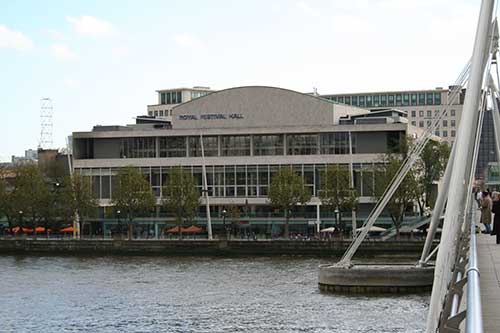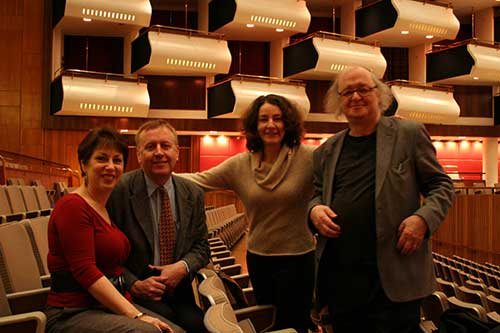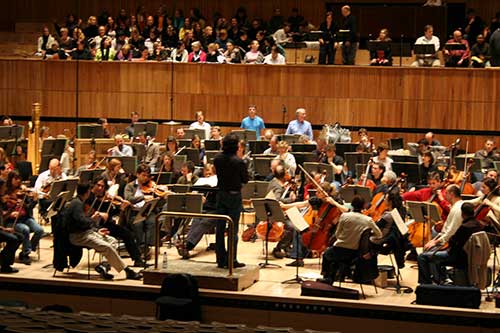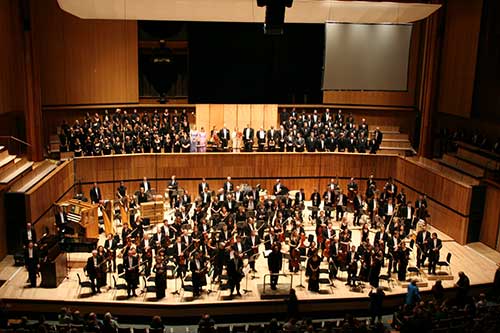Memorial 2007
Heliane: A Wonder By Troy O. Dixon
“Whenever I was asked about [Das Wunder der] Heliane, I used to tell people that Korngold wrote this opera for an orchestra that didn’t exist. After hearing the London Philharmonic Orchestra play it, I must retract that statement.”
Brendan G. Carroll, President of The International Korngold Society
20 November 2007, at the LPO dress rehearsal, speaking to the orchestra

Part 1: Dress Rehearsal
Tuesday, 20 November 2007 – London, the South Bank Centre.
First opened in 1951, the Royal Festival Hall has been under renovation for the past two years. With remodeling now complete, the concert hall is open again, and as part of its first “post-construction” season it has been host to a celebration of the music of Erich Wolfgang Korngold in a series of three concerts this November. The first concert presented a sampling of his Hollywood movie score music, and the second represented his concert music with a performance of the ever-popular Violin Concerto. But the highpoint of the series is tomorrow night when his operas are represented with a concert performance of his most ambitious opera, Das Wunder der Heliane. This morning was the dress rehearsal, and an amazing rehearsal it was.
Principal Conductor Vladimir Jurowski’s attention to detail has been startling. Reportedly he spent weeks learning and studying the piano reduction of the work because, (paraphrasing) “…[the opera] was written at the piano first, so to truly understand the details of the full score, it’s important to understand the composer’s creative process.” In the hall itself, Jurowski requested that many areas of the walls be dressed with curtains to better simulate the acoustics of the hall when a full audience is present. He discussed and tested placement of the off-stage brass section in different locations, not necessarily for the live audience in the hall (“…they’ll understand the brass is off-stage…”) but so that the brass will be best heard on the recording being made of the performance. And such attention seems to have paid off tremendously, as a small audience – including Katy Korngold and Brendan Carroll among others – sits transfixed by the orchestra’s playing.
“I found there is a lot [in Korngold’s music] to be discovered under the surface,” Jurowski is quoted saying in the Telegraph (17 November 2007 – www.telegraph.co.uk). For those in today’s rehearsal audience familiar with Korngold’s music, it seemed Jurowski was finding and expressing every nuance in the score. The result was, in Guy Wagner’s words, “a transfiguring experience”.

Kathrin Korngold Hubbard, Brendan G. Carroll, Jessica Duchen, and Guy Wagner at the dress rehearsal for Das Wunder der Heliane. (Guy Wagner’s German Korngold biography is to be published shortly.)

Part 2: The Performance
Wednesday, 21 November 2007 – the Royal Festival Hall.
“…The celebratory performances [during Korngold’s 1997 centenary] of his less often-heard works revealed what enthusiasts had been saying for years: there was far more to him than that…of an ephemeral Viennese wunderkind who had sold out to Hollywood.”
- Andrew Huth, the Guardian, 16 Nov 07
- Indeed, tonight’s long-awaited and much-anticipated UK premiere of Korngold’s fourth opera promised to show once more that his music has been undeservedly neglected. Taking place nearly 80 years-to-the-day after its world premiere in Hamburg on 07 October 1927, the performance of Korngold’s most ambitious opera, Das Wunder der Heliane (“The Miracle of Heliane”) concluded a series of three concerts by the London Philharmonic Orchestra honoring Korngold’s memory and music.
The story of Heliane is based on an unpublished, expressionist mystery play by poet Hans Kaltneker. The libretto (wrongly attributed to Kaltneker by nearly every reviewer and critic in the British papers) was written by Hans Müller and Erich Wolfgang Korngold – with additions by Erich’s father Julius Korngold. As pointed out by Korngold biographer Jessica Duchen in her thoroughly informative pre-concert lecture, the story-line is cumbersome, and not without confusions and inconsistencies, featuring “…strong elements of surreal Expressionism, a futuristic dystopia, a saint-like woman and a current of high, idealistic emotion.” (Duchen, from the concert program annotations). Korngold wrote arguably his greatest score for this story of all-conquering love, utilizing exhausting instrumentation (over 120 performers in the orchestra alone), off-stage brass and percussion, and a full choir, as well as the soloists themselves.
“…Korngold’s music had always been rich and sensual, but he outdid himself in Heliane. He reached the limits of his language in adventurous textures and bold harmonies, stretching his lavish orchestral and vocal resources to the utmost.”
- Andrew Huth, the Guardian, 16 Nov 07
Korngold’s music had always been informed by that of Richard Strauss, Mahler, Wagner, and his own teacher Zemlinsky, and his father had encouraged his compositional voice in the direction of conservative tendencies. Yet young Erich, only in his mid-twenties, would “…by no means…isolate [himself] against the harmonic enrichments which we owe to, say, Schoenberg’, and did not “…subscribe to any one [compositional] doctrine”. (Erich Wolfgang Korngold, quoted in the Neues Wiener Tagblatt, 1926) Heliane is a rich wonderland of orchestral sound, ranging from the almost austere choral opening into the realms of bi-tonality and atonality. It requires a massive orchestra, in which he demands each instrument to be played in a virtuoso style. And when it is pulled off well, the music is overwhelming.
And in tonight’s case, it was executed extremely well. The performance was a phenomenon, in the true sense a remarkable experience. Jurowski’s command of the orchestra was near indescribable. For those familiar with the score, he was able to maintain a tautness that brought forth every highlight, extended each line, and encouraged each section and player to meld completely with each other. The playing of the London Philharmonic was magical, magisterial, and monumental. For three-plus hours, the audience was enveloped in a sound-world unlike any other, Schoenberg’s Gurrelieder, Mahler’s Eighth Symphony, and even the operas of Wagner and Strauss considered.
The performance was not without failings, however. Given the huge number of forces arrayed across the stage, the soloists and chorus were relegated to the seats behind the orchestra. Even though physically above the orchestra, the soloists often had trouble projecting above the sheer power of the instruments below. (We can only hope the live recording being made of this performance corrects the balance.) And even with the “not-quite-the-best” translations projected as supertitles, the words were often obscured within the totality of the music – again a failing of the placement of the soloists – and thus the progress of the story-line might often have been confusing for the audience.
While periodically drowned out by the spectacular orchestration, the singers nevertheless delivered a commanding performance. And the Europachorakademie chorus – “terrifying” in its power and presentation according to one person (especially in the third Act), received acclaim from many of the critics and reviewers. Though the Zwischenspiel prior to Act III appears to have received a near-universal positive note from the critics (“…a thing of almost transcendent beauty”, writes one), the average critical rating in the papers the next several days was only three of five stars, leading one to question whether a lack of familiarity, understanding, or even personal preferences might have predominated.
But for the surprisingly large array of Korngold admirers and aficionados present in the audience, the night was an overwhelming success. In the words of one critic, “Eighty years on, not just a necessary premiere at best, an intoxicating one.” (Neil Fisher, The Times, 23 Nov 07) It was certainly the first live performance for many of us (the opera was most recently staged in another concert performance in 1995 in Amsterdam, and has not been staged in decades), and we hope a second is not far away.

Originally posted December 2007 — reformatted January 2011
